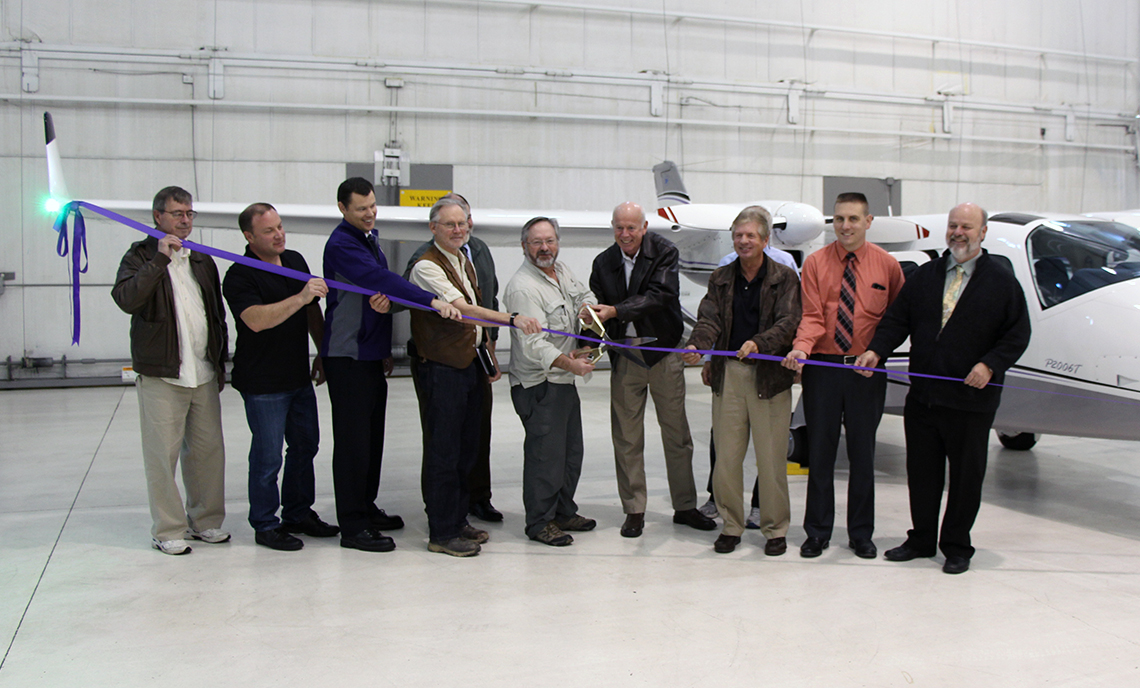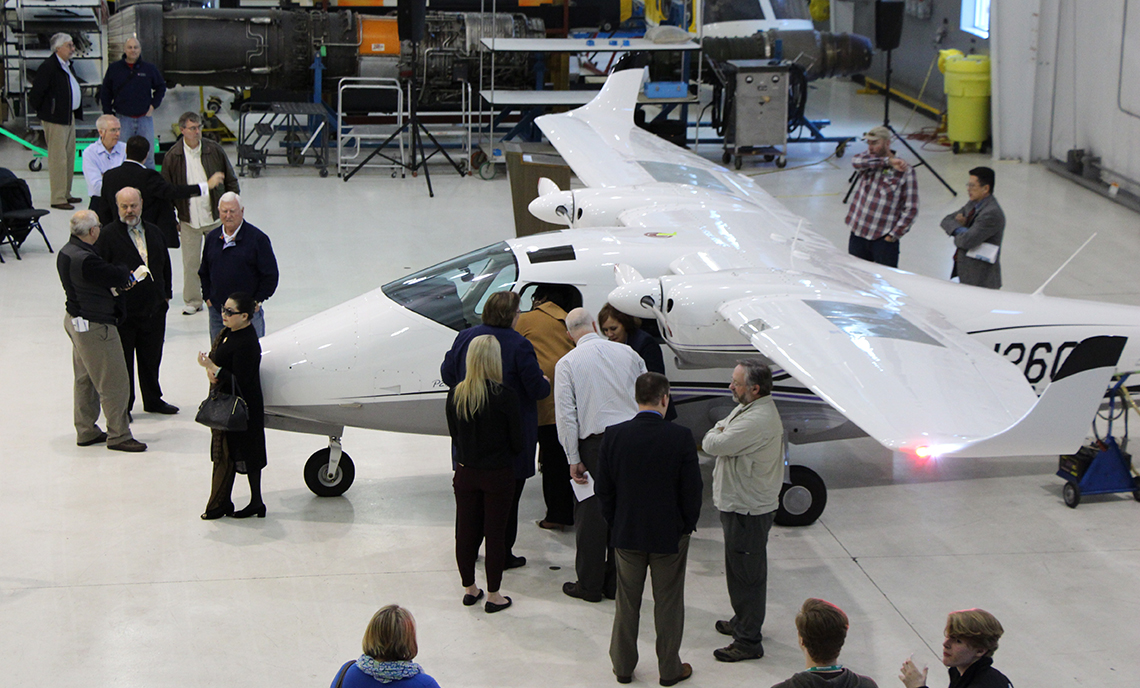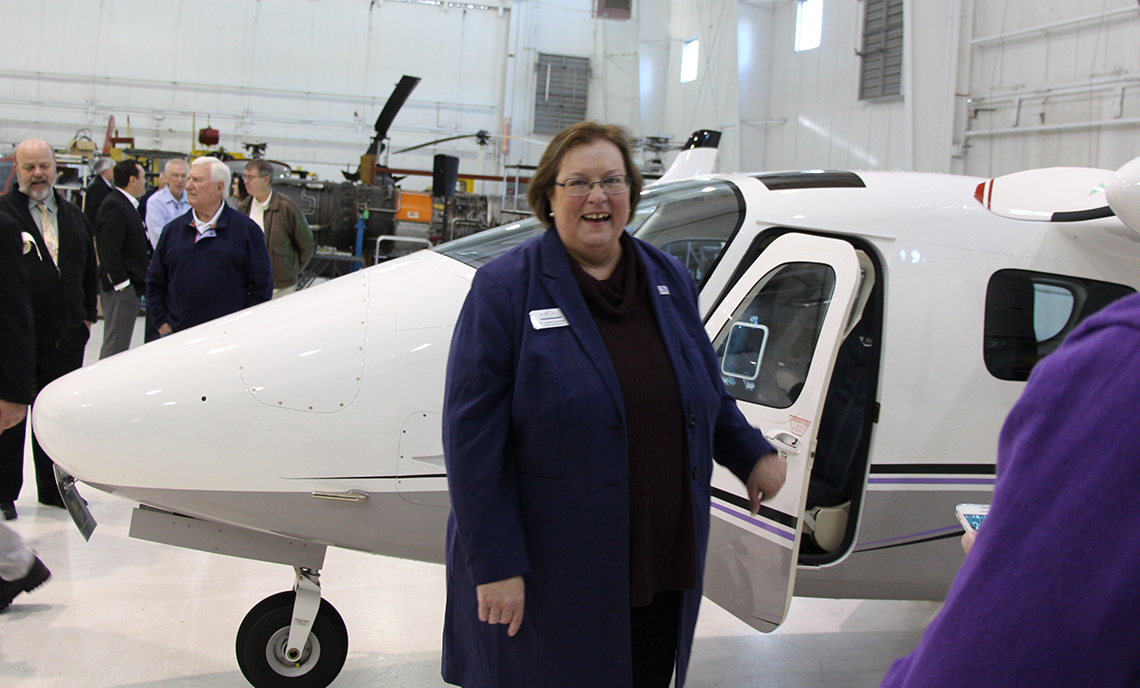
CPTC Unveils New Twin-Engine Plane
A new step forward for the Clover Park Technical College aviation programs took place Thursday, as the college officially unveiled and dedicated its new twin-engine Tecnam P2006T airplane at its South Hill Campus.
“We’re here today, on this Thursday, November 17, 2016, to dedicate this new twin-engine plane to the service of Clover Park Technical College,” CPTC Interim President Joyce Loveday said. “We commend it to be used for the training of students who are preparing to embark on careers as professional pilots. We entrust the faculty and staff to gently care for this plane and provide meticulous maintenance that will ensure long usage and, above all, safe operations for all who fly in it.
“May this plane operate for many years, preparing students with the experience and skills necessary to safely fly multi-engine aircraft. May it launch them toward new opportunities to excel in their chosen careers, and may it carry Clover Park Technical College forward to many more years of responsive and successful training for the Professional Pilot program. It will enable CPTC to continue as a leader in aviation education for years to come.”
The event featured close to 100 attendees, including state legislators, local business partners, media members and more. Loveday shared the history of the CPTC aviation programs and highlighted the growth of the programs over the past nearly 75 years. She pointed to the close interdependent relationships between the Professional Pilot and Aviation Maintenance programs and the vision and commitment of faculty members as key contributors to the programs’ successes. She also thanked the Board of Trustees and the programs’ Advisory Committee for the roles they played in acquiring the new plane.
“The faculty provided the vision for where the program needed to go, but they didn’t do it alone,” Loveday said. “They listened to their Advisory Committee members, who had been advocating for more than a couple years for a twin-engine plane with a glass cockpit. Composed of industry professionals, the Advisory Committee provided insight and wisdom to help the program remain current and provide the best training possible for our students. I want to give special thanks to them for their insight and perseverance relating to the need for the plane.”
CPTC Board of Trustees chair Bruce Lachney, a former professional pilot, also spoke about the importance of the new plane to the growth of the programs. Professional Pilot instructor Lucas Holm and Advisory Committee chair Bob Lane also shared a few words about the plane. Holm flew the Italian-built plane to Washington after it was assembled in Florida and previously spoke about the attention it attracted throughout the journey home.
“Everywhere we went, every stop we made, people were just amazed by the airplane and wanted to know what kind of plane it is,” Holm said. “There are only around 300 of these in the world and fewer than 200 registered in the United States. We had commercial pilots asking about the plane as they saw it. It really attracted a lot of attention.”
While industry demand for professional pilots is extremely high, CPTC previously did not have the means to provide students the training hours needed to obtain twin-engine certification. This new plane allows for that training, and it does so at significant cost savings for students over what they were paying elsewhere. The plane’s extreme efficiency in both fuel and maintenance costs will prove a fantastic benefit to students.
“This plane really has low operational costs,” Holm said. “We don’t want to be charging the students a lot of money to be operating the aircraft, and this allows us to offer advanced training at a reasonable rate. The engines, the fuel and the maintenance on this aircraft are all much lower in terms of cost than other twin-engine planes. That makes it a more affordable training opportunity for students.”
Members of the Advisory Committee and program faculty joined Lachney for the official ribbon cutting to cap the event. Afterward, attendees had a chance to climb inside the plane and check out the glass cockpit displays, ask questions and enjoy some snacks courtesy of the CPTC Foundation. For CPTC, the event was the final step in a long process that will see tremendous benefits to students.
“The acquisition of a twin-engine plane takes flight training offered at Clover Park to a new level,” Loveday said. “Until now, students who had the goal of working for a commuter airline had to transfer to another college to get their twin-engine certification. Now students completing their training at Clover Park will have expanded career opportunities that will serve them well.
“With the acquisition of this new plane comes the opportunity to better serve our students, as well as the responsibility to step up and meet the needs of industry for pilots in new ways. Our faculty have begun that work, and we will continue to expand opportunities to train well-qualified pilots in response to the growing demand.”
Share This Story


Ready to learn more? Visit the Professional Pilot program page on the Clover Park Technical College website.